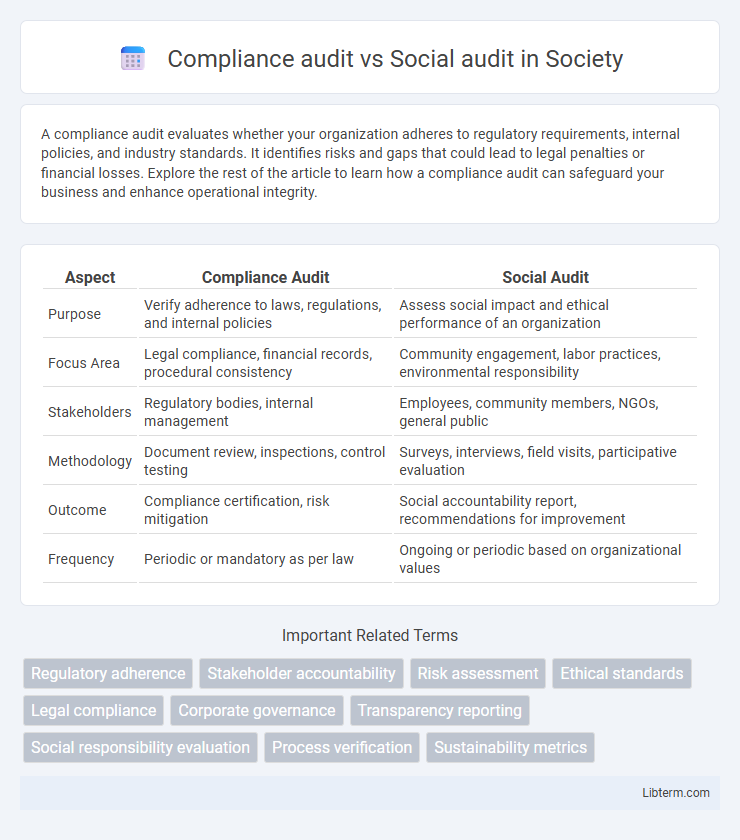A compliance audit evaluates whether your organization adheres to regulatory requirements, internal policies, and industry standards. It identifies risks and gaps that could lead to legal penalties or financial losses. Explore the rest of the article to learn how a compliance audit can safeguard your business and enhance operational integrity.
Table of Comparison
| Aspect | Compliance Audit | Social Audit |
|---|---|---|
| Purpose | Verify adherence to laws, regulations, and internal policies | Assess social impact and ethical performance of an organization |
| Focus Area | Legal compliance, financial records, procedural consistency | Community engagement, labor practices, environmental responsibility |
| Stakeholders | Regulatory bodies, internal management | Employees, community members, NGOs, general public |
| Methodology | Document review, inspections, control testing | Surveys, interviews, field visits, participative evaluation |
| Outcome | Compliance certification, risk mitigation | Social accountability report, recommendations for improvement |
| Frequency | Periodic or mandatory as per law | Ongoing or periodic based on organizational values |
Introduction to Compliance Audit and Social Audit
Compliance audit evaluates an organization's adherence to regulatory requirements, internal policies, and contractual obligations, ensuring legal and procedural conformity. Social audit examines an entity's social impact, assessing ethical practices, community engagement, labor rights, and environmental responsibility. Both audits play crucial roles in improving transparency, accountability, and sustainable business operations.
Key Differences Between Compliance and Social Audits
Compliance audits primarily assess adherence to laws, regulations, and internal policies, ensuring organizations meet legal and contractual obligations. Social audits evaluate the impact of business operations on community welfare, labor conditions, and ethical standards, focusing on social responsibility and stakeholder engagement. Key differences lie in their scope: compliance audits emphasize regulatory conformity, while social audits prioritize social performance and ethical accountability.
Objectives of Compliance Audit
Compliance audit primarily aims to verify an organization's adherence to regulatory requirements, internal policies, and legal standards, ensuring risk management and avoiding penalties. It systematically assesses operational procedures and controls to detect non-compliance issues, safeguarding financial integrity and corporate governance. Unlike social audits focusing on ethical practices and stakeholder impact, compliance audits concentrate on legal conformity and regulatory frameworks.
Objectives of Social Audit
Social audits primarily aim to evaluate an organization's impact on social, environmental, and community aspects, ensuring transparency and stakeholder engagement. Unlike compliance audits that focus on adherence to laws and regulations, social audits assess corporate social responsibility (CSR) initiatives, ethical practices, and sustainability efforts. This process empowers communities and stakeholders by verifying claims of social performance and promoting accountability beyond financial metrics.
Scope of Compliance Audit
The scope of a Compliance Audit primarily focuses on evaluating an organization's adherence to regulatory requirements, internal policies, and contractual obligations, ensuring legal and operational conformity. It systematically examines financial records, operational processes, and reporting mechanisms to detect any deviations or non-compliance issues. This audit is crucial for mitigating risks, avoiding penalties, and maintaining regulatory approvals.
Scope of Social Audit
Social audit focuses on evaluating an organization's social performance, including labor practices, community engagement, environmental impact, and adherence to human rights standards. It involves a broader scope than compliance audits, examining qualitative aspects such as stakeholder participation, social responsibility initiatives, and transparency in reporting. Unlike compliance audits that concentrate on legal and regulatory adherence, social audits emphasize ethical accountability and the social impact of business operations.
Methodologies Used in Compliance vs Social Audits
Compliance audits employ structured methodologies centered on verifying adherence to laws, regulations, and internal policies through document review, interviews, and testing controls. Social audits utilize participatory approaches, including stakeholder questionnaires, community meetings, and qualitative assessments to evaluate social responsibility and ethical practices. Both methodologies emphasize data collection and analysis but differ in focus: compliance audits prioritize regulatory conformity while social audits assess social impact and accountability.
Legal and Regulatory Implications
Compliance audits examine adherence to legal and regulatory requirements, ensuring organizations meet industry-specific laws and standards such as financial regulations, labor laws, and environmental policies. Social audits evaluate corporate social responsibility initiatives and ethical practices, assessing impacts on stakeholders beyond mere legal compliance, including human rights, community engagement, and sustainability commitments. Legal implications in compliance audits primarily focus on identifying violations that could result in fines or sanctions, while social audits emphasize reputational risk and voluntary adherence to societal norms.
Impact on Organizational Reputation
Compliance audits verify adherence to legal regulations and internal policies, ensuring an organization meets mandatory standards that protect its reputation from legal risks. Social audits evaluate ethical, environmental, and community impacts, fostering transparency and trust among stakeholders, which enhances corporate social responsibility credentials. Both audits significantly influence organizational reputation by demonstrating accountability and commitment to sustainable and lawful business practices.
Choosing the Right Audit for Your Organization
Selecting the right audit between compliance audit and social audit depends on your organization's goals and regulatory environment. Compliance audits focus on adherence to laws, regulations, and internal policies, ensuring legal and operational accountability. Social audits evaluate the organization's impact on stakeholders and community well-being, emphasizing transparency, ethical practices, and corporate social responsibility.
Compliance audit Infographic

 libterm.com
libterm.com